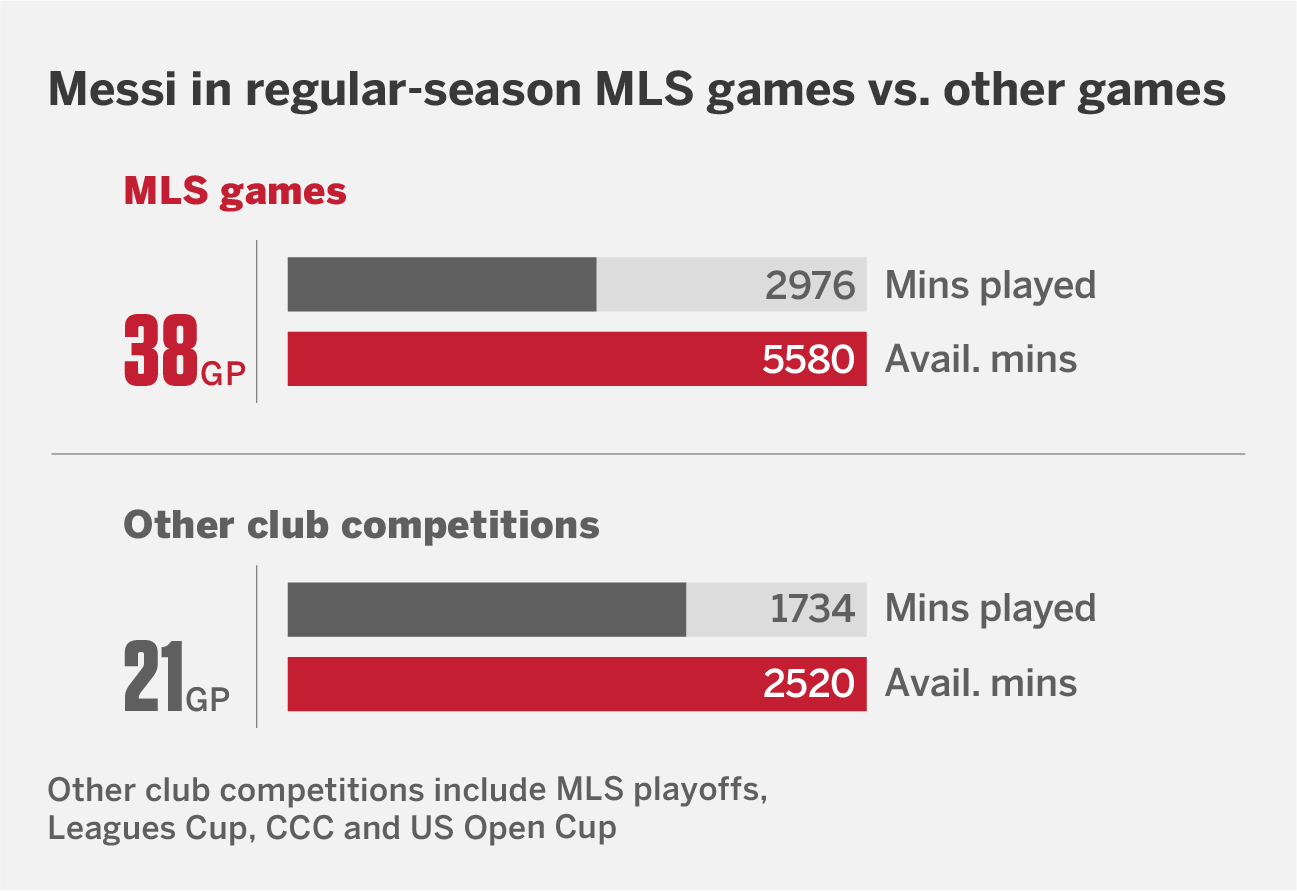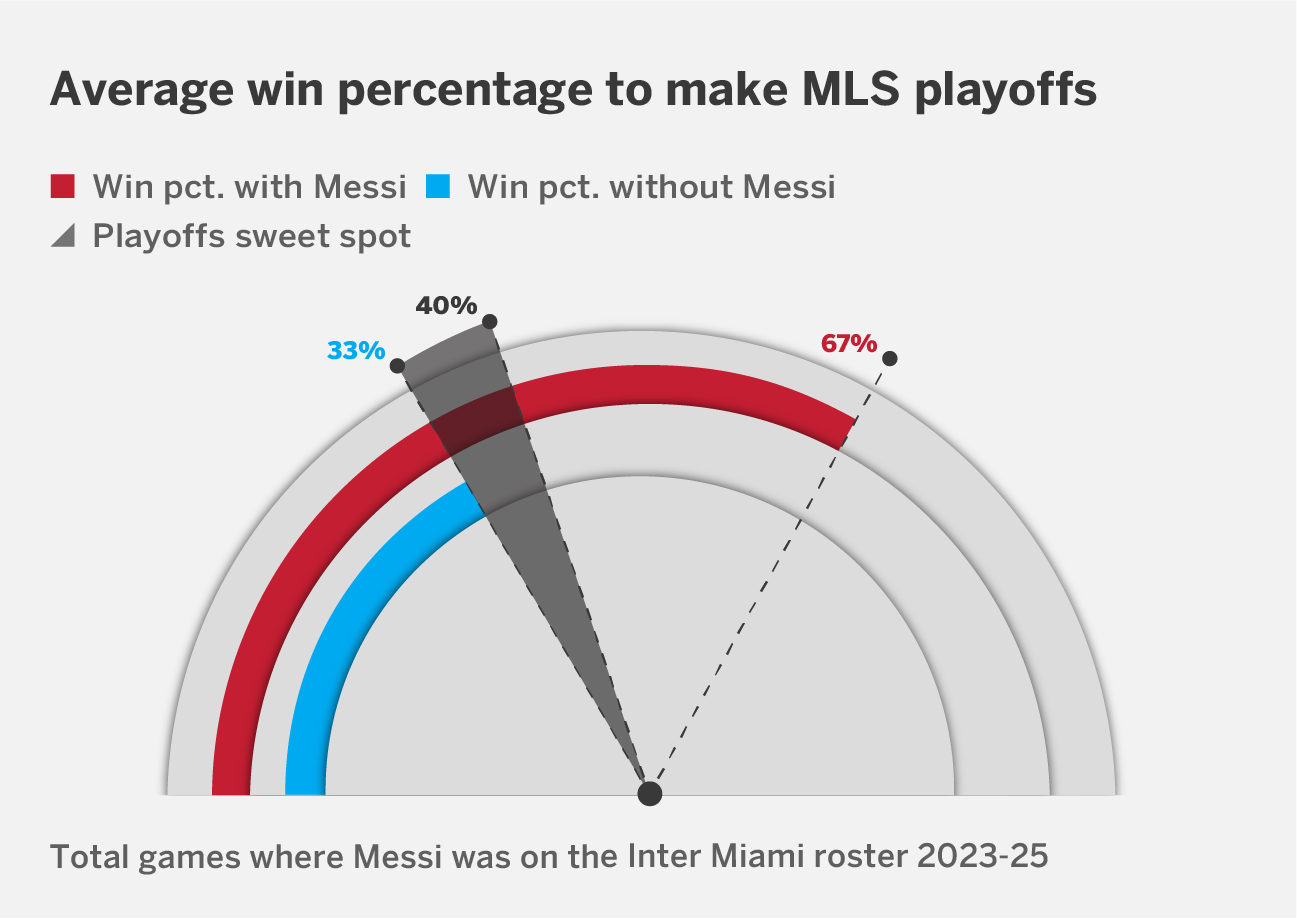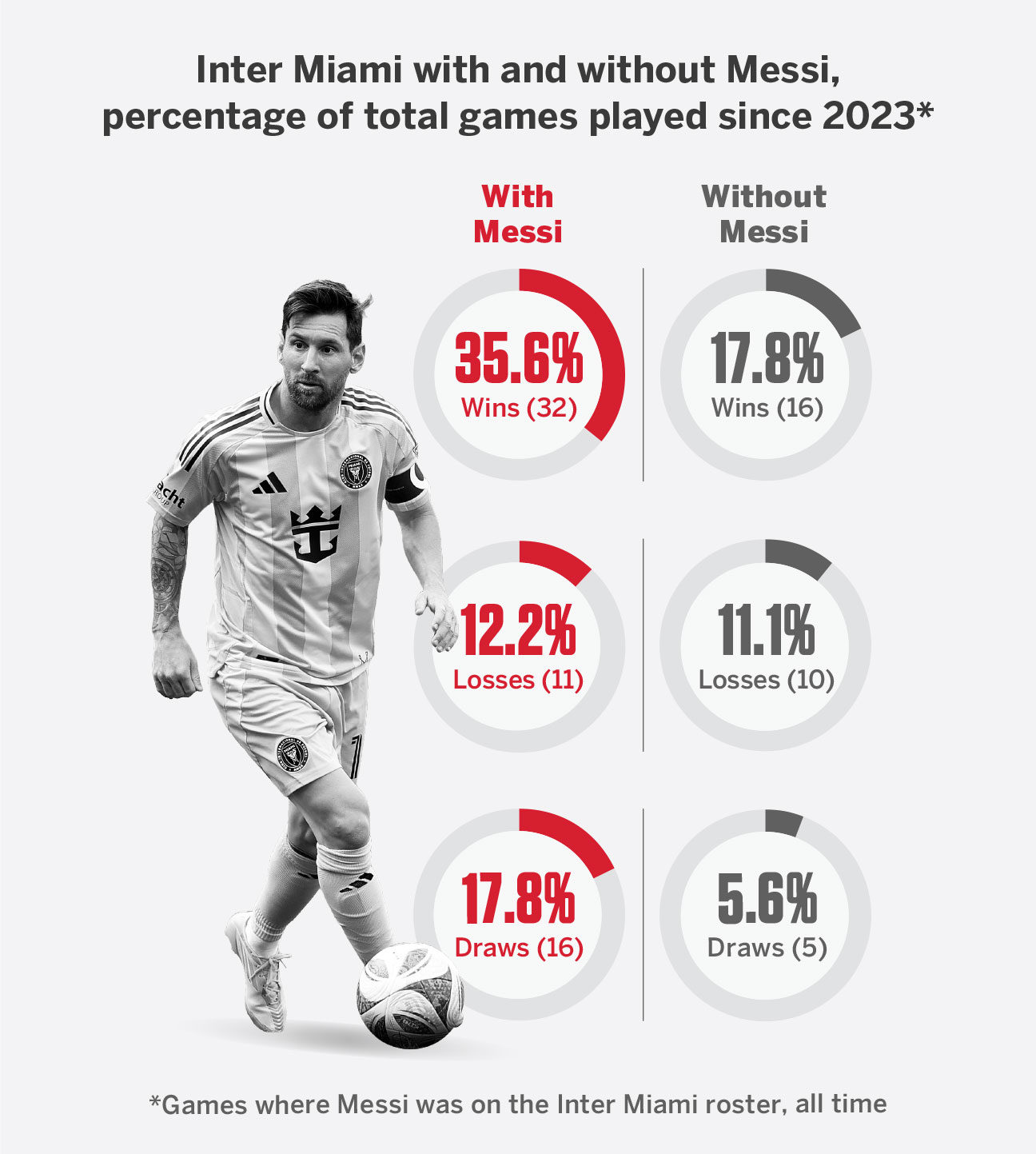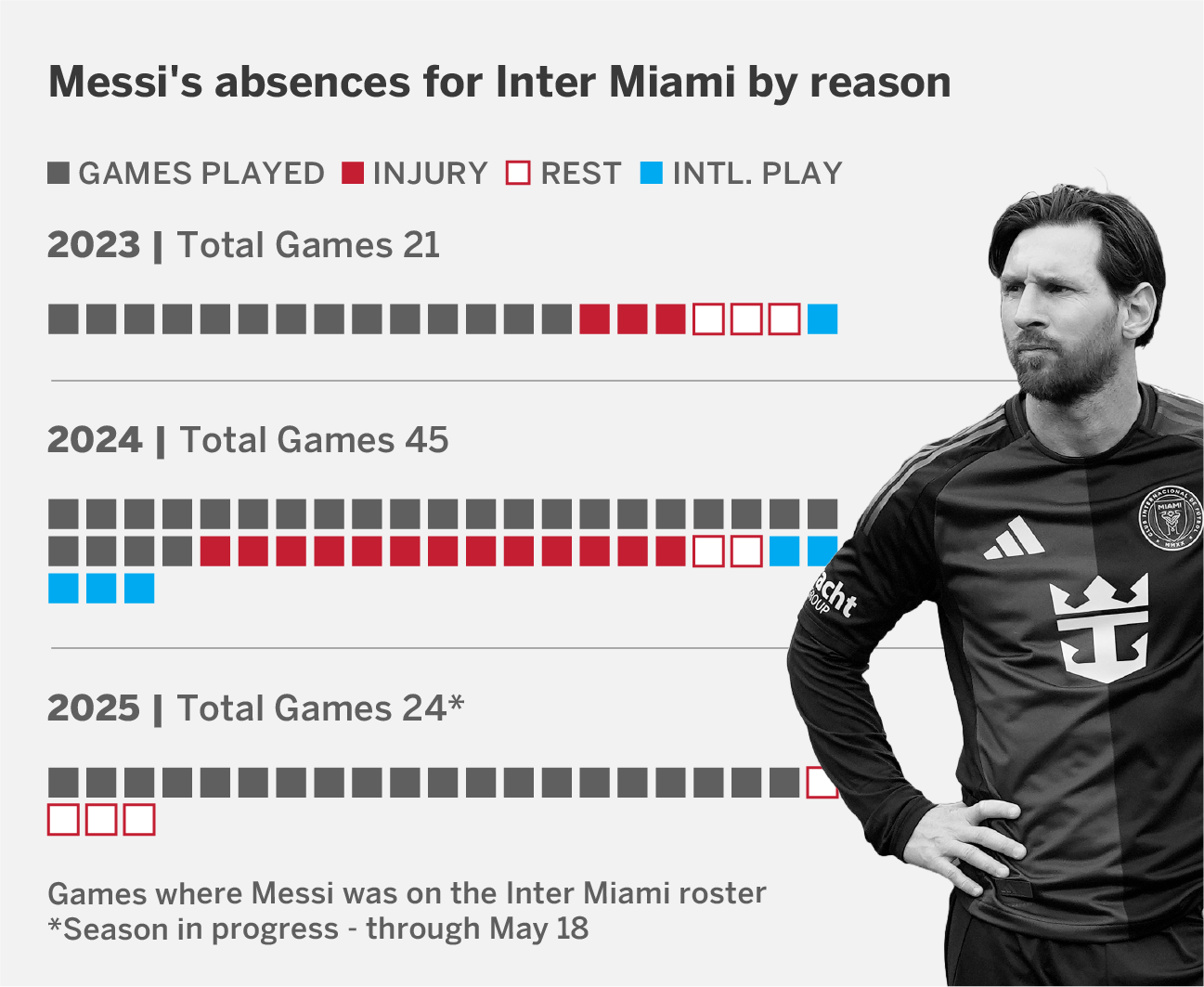Throughout the 2024 Major League Soccer season, Inter Miami captain Lionel Messi played in a mere 55% of available games. Still, despite his limited participation in a pink jersey, Messi led the club to the Supporters' Shield and an MLS points record, and he was named the league MVP.
To do that, Messi just needed 19 games (or 1,485 minutes) to prove himself last season with 20 goals and 16 assists.
Then-Inter Miami manager Gerardo "Tata" Martino had quickly realized the team could rest 37-year-old Messi when necessary and still qualify for the most important aspect of MLS: the postseason. According to ESPN Research, teams historically have needed to win only about a third of their regular-season matches to qualify for the playoffs. With new head coach Javier Mascherano at the helm, Messi's involvement with Inter Miami follows a similar pattern.
"The MLS season allows you to fail in certain games -- the knockout phase of a continental league doesn't; it means you're out," Mascherano said earlier this season, referring to Concacaf Champions Cup. "But the CCC playoffs prepare you for what's coming in October with the playoffs. In the end, the MLS is a long season that ultimately boils down to a continental cup where knockout phases are the norm, and in the end, you can't fail."
As Miami prepared for the Club World Cup, which continues with a game against FC Porto on Thursday, the club has been saving its best player for when it really needs him.

Winning as many games as possible isn't necessary for a successful season for an MLS team. It's about winning the right games. The Club World Cup, the Concacaf Champions Cup and the Leagues Cup are knockout games in which Inter Miami makes sure to play Messi if they can. The MLS playoffs are, too.
But the MLS regular season? Not so much. Unlike Messi's former leagues LaLiga and Ligue 1, consistent success throughout the season and first place in the table does not equate to the trophy in MLS. Instead, the U.S. league features a playoff system in which the top seven teams from two divisions at the end of the regular season directly qualify for the postseason tournament.
In the newly revised MLS rules, slots eight and nine on each conference table compete in a one-game series for the last spot in the playoffs. Each conference has 15 teams, which means more than half of teams in MLS make the postseason.
In the past two years, teams that accumulated between 40-45 points throughout the season managed to qualify to the playoffs as the last seeds. In 2024, CF Montreal secured eighth place with just 43 points in 34 games while Atlanta United narrowly beat out D.C. United for ninth place with 40 points.

As Mascherano says, the format is forgiving, as teams can lose a number of matches without negatively impacting their chances to make playoffs, the first bar to clear for success in MLS. Though Atlanta United stood as the last team to qualify to the postseason with a 10-10-14 (W-D-L) record in 2024, the team went on to eliminate Miami, the Eastern Conference leaders and Supporters' Shield winners in the first round.
The league incentivizes teams to conclude the regular season in the first slots of the table to secure home-field advantage and fight for the Supporters' Shield, but once they qualify for the playoffs, anything can happen.
In 2023, fans saw Martino rest Messi for inconsequential matches, keeping him in reserve for when they needed him. Down the stretch of 10 or so games before the playoffs, he missed 25% of his available MLS regular-season matches not due to injury, but just so he could rest.
Toward the end of the 2024 MLS campaign, Martino left Messi out of the starting 11 in the two games leading up to the playoffs. Again, it wasn't for injury but to rest him because Miami had already secured a spot in the playoffs. He played a combined 65 minutes throughout those two matches, saving energy while maintaining a necessary rhythm for the first-round playoff series against Atlanta United, where Messi featured all 270 minutes -- and Miami still lost in an upset.
"We made the decision on Friday to rest the players. It made sense after two full games that we made some rotations, and we had players ready to go," Martino said before the playoffs. "We were able to complete our two objectives. One was to give players some rest and also to win the game because of what it means from a motivational standpoint to be in position to break the points record."

And now, in 2025, the pattern continues. Per ESPN Research, Messi has played 73% of the available minutes with Inter Miami in MLS this season, compared with 86% of the minutes played in the Concacaf Champions Cup this season, including added time. He has featured more since mid-May, but that was intended to get him up to match fitness given their elimination from the Concacaf Champions Cup.
Inter Miami kicked off the 2025 campaign juggling MLS and the Concacaf Champions Cup, playing one game every three days in international destinations. The team quickly transitioned from the offseason into two demanding competitions, forcing the club to alter the training schedule to accommodate the immense amount of playing time. Although Mascherano insists that Messi is accustomed to playing under such demands after doing so for most of his career, fatigue and load management once again began to creep into the conversation.
After qualifying for the Concacaf Champions Cup semifinals for the first time in club history, the team had a schedule crunch: Vancouver in Canada on April 24, FC Dallas at Chase Stadium in Fort Lauderdale on April 26 and finally the second-leg CCC match against the Whitecaps on April 30.
The team and Mascherano entered the week with a plan, reverting to the strategy seen in 2024 when Miami prioritized international competition and rested Messi altogether. The captain played the full 90 minutes of the first leg against Vancouver before earning a break. He then missed the training leading up to the game vs. Dallas, with Mascherano citing fatigue: "Messi ended the [first-leg] game [against Vancouver] well. Obviously he was fatigued. Playing on synthetic grass can make a player even more fatigued due to the floor."
Messi sat out the regular-season MLS match against Dallas entirely. Miami lost 4-3 before returning to action when hosting the Whitecaps for the second leg.

"Obviously we decided, like many of his teammates, to reserve him after the game against Vancouver where we had to travel for six to seven hours and play on synthetic grass," Mascherano said after the Dallas match. "But he's good; he trained today, so he's ready [for the second leg against Vancouver in the CCC]."
Messi also sat out three matches in March to prevent fatigue as the later stages of the Concacaf Champions Cup approached. He watched as Inter Miami won two regular-season MLS matches and the Concacaf Champions Cup first-leg round-of-16 match without him.
At the time, Mascherano cited load management as the reason for resting Messi as he explained the team aimed to prevent any sort of fatigue as the later stages of the international tournament quickly approached.
"Since we want to take care of him and we don't want to make him feel fatigued, we decided to give him rest, knowing the risks we're facing," Mascherano said to the media on March 6. "Obviously, not having the best player in the world is complicated."
At 37 years old, Messi has managed to adapt his technique on the field and create a training regime off the field to keep playing at a high level. But as he said himself last year: "Rest is very important nowadays. As we get older, everything is more difficult."
"I know that as soon as I believe that I can no longer perform, or no longer enjoy the game, or am not able to help my teammates, then I will stop," Messi said.
Rest and skipping fewer important MLS games has been the key for Messi to help his teammates when it counts. During the Club World Cup starts, a similar pattern may emerge, too.
